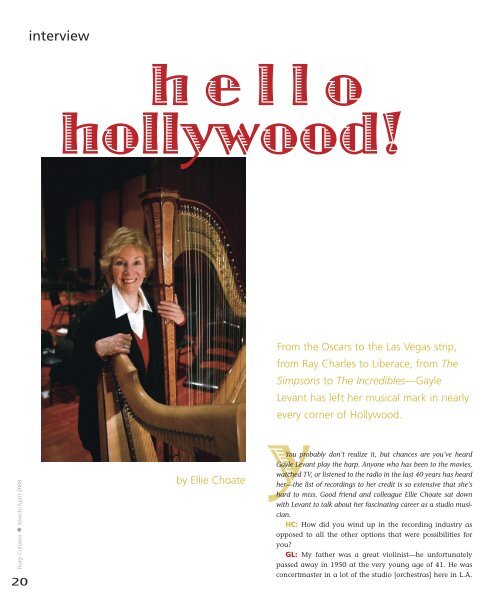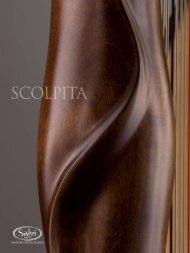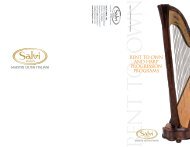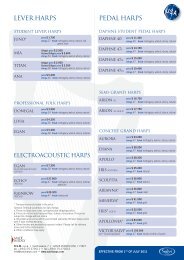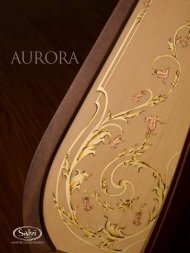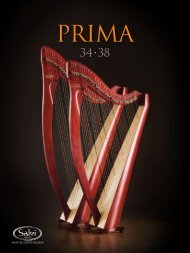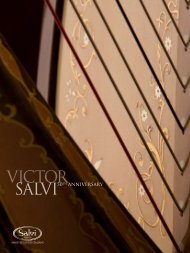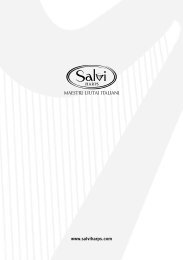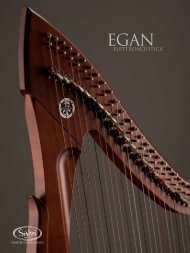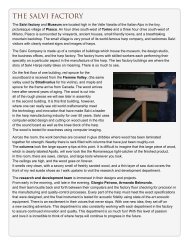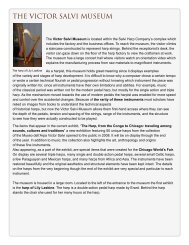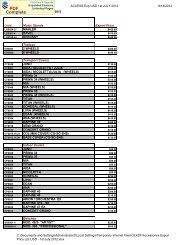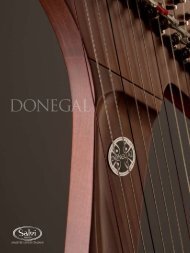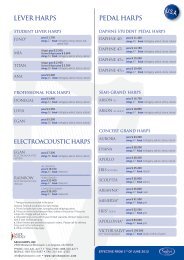Gayle Levant - Salvi Harps, Inc.
Gayle Levant - Salvi Harps, Inc.
Gayle Levant - Salvi Harps, Inc.
- No tags were found...
You also want an ePaper? Increase the reach of your titles
YUMPU automatically turns print PDFs into web optimized ePapers that Google loves.
interviewh e l l ohollywood!From the Oscars to the Las Vegas strip,from Ray Charles to Liberace, from TheSimpsons to The <strong>Inc</strong>redibles—<strong>Gayle</strong><strong>Levant</strong> has left her musical mark in nearlyevery corner of Hollywood.March/April 2008Harp Column •20by Ellie ChoateyYou probably don’t realize it, but chances are you’ve heard<strong>Gayle</strong> <strong>Levant</strong> play the harp. Anyone who has been to the movies,watched TV, or listened to the radio in the last 40 years has heardher—the list of recordings to her credit is so extensive that she’shard to miss. Good friend and colleague Ellie Choate sat downwith <strong>Levant</strong> to talk about her fascinating career as a studio musician.HC: How did you wind up in the recording industry asopposed to all the other options that were possibilities foryou?GL: My father was a great violinist—he unfortunatelypassed away in 1950 at the very young age of 41. He wasconcertmaster in a lot of the studio [orchestras] here in L.A.
One day when I was 3 years old, he must haveplayed a wrong note, and I went screaming down thehallway, “Mommy, Mommy! Daddy hit a wrongnote!” And at that point my parents looked at eachother—my mother was musical as well, she playedthe flute and violin—and it was decided that maybeI should start piano lessons. And that’s where it allstarted, from the piano. I studied the piano untilshortly after I made the transition to the harp. Butthe piano was my foundation. I don’t remember if Iwas introduced to the harp because my mom startedtalking about it when I was 11, or if it was from goingto youth symphonies on Saturday mornings—theL.A. Phil would have the Symphony for Youth concerts,and I remember Stanley Chaloupka was theharpist. I’ll never forget the feeling I had when I sawhim actually pick up the harp, put it over his shoulder,and walk off the stage!HC: That is a remarkable sight!GL: That’s right. So anyway, whether it was mymom, whether it was my talking about it, whoknows? The bottom line is we got a harp in thehouse, and I started harp lessons with Hazel Bruster.She was an incredible woman. It was the most naturaltransition to go from the piano to the harp.Should a child wanting to learn the harp study thepiano first? I know there are mixed feelings about it.I definitely am for it, because it gives you everythingon the black and white keys—you know, the wholerange. And when you make the transition to harp,for me it just made so much sense.I studied with [Bruster] privately until I was about15, and then she wanted me to study with a womanby the name of Raiya Kibbee, who was a realtaskmaster. When I would go to my lessons at herhome, I’d come out after an hour and a half or so justwringing wet, mad and infuriated and excited andexhilarated all at the same time, depending on thetype of lesson I’d had.I was still very active with the piano all throughschool. I started playing piano for choirs. To this day,I love playing for choirs. I had just transitioned fromclassical piano to jazz. And I remember the jazzteacher saying to me, “What would you like to dowhen you grow up?” And I must have been about 12then, I had had some harp lessons. I said, “I want tobe like my daddy. I want to play in the studios.” Andhe said, “Well, there are so many incredible pianistsin this city, that if you really want to do it, you shouldreally go after the harp, and really pursue it, becauseyou’ll have much more opportunity.” It was the bestadvice I ever had.HC: If your father had not been a studio musician,do you think you would be as likely to makethat choice?GL: I’m sure it’s my frame of reference with mydad. However, I’ve always loved sight-reading, and Idon’t like things that I have to keep doing over andover. I was a voracious reader. As a little girl I wasalways buying piano music. I just couldn’t getenough. It’s like people whoread books, I couldn’t stopreading—I loved sight-reading.HC: You studied all this classicalrepertoire, and then youwant to do studio playing. Howdid the classical foundationinfluence your studio playing,and what things do you needto know in the studio that youmay or may not have learnedfrom the classical stuff?Because obviously there aresome differences.GL: Right. Well, let me justkind of go in a progression ofanswers. After high school, Iwas the harpist for USC’s symphony,and UCLA, and theYoung Musician’s Foundation,and Debut, as well as Ontario,and Rio Hondo, the BeverlyHills Symphony—I was justrunning around everywhere. Iwas having a grand time, but Istill had in the back of my mind wanting to go intothe studio business. The first time I was in a studiowas when I was 15, and then I actually did my firstcommercial when I was 17. I was driving alone andit was the first time I heard myself on the radio! AndI just—I almost went into the center divider! I got soexcited...!HC: That’s a very promising career right there!GL: Yes, and nobody was there to hear it, but Iwas so excited! And that just confirmed it for me. Imust have been about 18 at that point, and that’swhen I just knew that I wanted to be in the studios. Inever had aspirations to be a concert harpist, to betraveling. It’s a lonely way of living your life because,you know, it’s not easy, and I admire soloists that dothat kind of work, whether it’s on the harp, the violin,the piano, whatever. But I love studio work. Soafter I had done a lot of the community orchestras, Istarted working. I worked up in Tahoe.FOR THE RECORD<strong>Levant</strong> recalls some of the singers she hasperformed and recorded with over theyears.Christina AguileraClay AikenPaul AnkaBurt BacharachTony BennettDavid BenoitAndrea BocelliMichael BoltonBobby BrownMichael BubleThe CarpentersKelly ClarksonNatalie ColeCeline DionBaby FaceMichael FeinsteinKenny GJosh GrobanCharlie Haden QuartetWhitney HoustonJames IngramRon IsleyMichael JacksonDiana Krallkd langQueen LatifahBarry ManilowJohnny MathisBette MidlerRonnie MilsapTeddy PendergrassLionel RichieKenny RogersNeil SedakaBrian SetzerFrank SinatraRod StewartBarbra StreisandSteve TyrellDionne WarwickMarch/April 2008Harp Column •21
March/April 2008Harp Column •22<strong>Levant</strong> floats alongin the lagoon at therestaurant at theDunes Hotel in LasVegas in 1965.HC: In the hotels, you mean?GL: The hotel was Harrah’s Tahoe. And ironically,my mother had remarried to a man named DukeGoldstone who actually was the director and producerof the Liberace series back in [the fifties]. So whenthe call came, which came actually from Liberace’sconductor, Gordon Robinson, I knew that name reallywell because I had met Liberace when I was 11. Hedidn’t know my name as <strong>Gayle</strong> <strong>Levant</strong>, which is mymaiden name. So I remember Gordon called one day,and he said, “We’re looking for a young harpist that’snice-looking, who can improvise and would like to befeatured with Liberace,” and I said of course.Because I was doing a lot of private parties andweddings and fashion shows at that time, I had tohave a lot of pretty gowns. And I remember GordonRobinson, the conductor, saying to me, “Could I possiblycome over and meet you?” And he came over tothe house, and he said, “You know, Lee really likesthings to look beautiful. Do you have any pretty outfitswe could show him?” I said yes, and I showed hima few things. He said, “Oh <strong>Gayle</strong>, this is great! I’d liketo take you up to meet Liberace.” And I said, “Fine!”So we go up to Lee’s home, and I meet him, and he’sabsolutely delightful—and, of course, I’d met himyears ago—and I show him the gowns, and one ofthem had feathersall over the bottom,ostrich feathers. Andhe loved all this, so Igot hired. And I said,“Okay, now can Italk to both of you?”And they both said,“Sure.” And I said,“Do you rememberthe name DukeGoldstone?” Andtheir ears perked up,and they said, “Well,of course.” And Isaid, “That’s my stepfather!”Well, fromthen on it was likebringing a familyback together.HC: But on theother hand, youlanded the job onyour own merits.GL: That’s right;they had no ideawho I was, and I don’t know how they got my name.So it was a double thrill for everybody, because whenI got home, my mom said, “Did you get a job today?”I said, “Yes, I got a job.” “Well, what are you going todo?” And I said, “Well, I’m going to Lake Tahoe, I’mgoing to play the harp with Liberace,” and she said,“You what?” So I went up to Tahoe and did the showfor three weeks. I had a grand time. Got written up inthe paper, got my picture in the paper. It was justamazing.HC: Must have been the fabulous gowns, too.GL: Well, the gowns were beautiful. They were.And I could wear anything I wanted, because theharp was right up on the center of the stage, and itwas terrific!HC: What kind of instrumentation did he have?Did he have a whole backup band?GL: Yes, it was a full orchestra, everybody inblack, and one time I’d come out with a gold satinoutfit, another time I’d be in turquoise. I’d always bein colors. So it was nice.HC: Fun.GL: The house conductor at Harrah’s had heardme play, and he liked what I did. The next thing thathappened was I stayed on to work with JudyGarland, and then Nat King Cole. And Judy Garlandhad been my hero, I just loved her voice. So to havethe privilege to actually be on stage and play hermusic—I mean—I couldn’t believe this was happening.It was magic. So I stayed on, I was with Liberace,then Judy Garland, then Nat King Cole. I went togrammar school with his daughter—she used to geton the school bus with me every day. So it was likecoming home to a family. And Nat gave me a nickname,because I wasn’t of age to be in the casinos; Iwas too young! He used to call me “Little Bit.” I’dalways have to walk through the kitchen to get to thestage, because I wasn’t of age! One time I walked inthe casino, and he was playing roulette, and he said,“Come over here, Little Bit, give me some luck!”Anyway, it was a wonderful, wonderful period,and I was up in Tahoe for about a year. When I gotback to L.A., I worked at the Beverly Hilton for threeyear years, six nights a week, playing solo music foran hour before the group would join me, and thenwe’d play dinner music for the rest of the evening. Wenever had really set arrangements. Sometimes we’dhave a rehearsal, but basically I would just improvisethe whole evening. Playing every night for an houralone, I really started to develop a repertoire of themusic of that time. This was back in the ‘60s, whenmy ear really became accustomed to harmonies and
chord changes.HC: So playing jazz piano must havecarried across into that.GL: Oh, yes! What happened was Ifound that as I was starting to play,whether it was by myself or playing withgroups, I always saw the keyboard in frontof me—it was always in my eyes. So I wasalways thinking the piano at the harp.And when I would play alone, and playsolos, I never had music. I would just playby ear. And I wouldn’t play anythingunless I knew all the lyrics. And then Iwould play as if I were singing, so I reallyended up singing through my fingers.And I still do the same today when I play.I’m singing through my fingers, because Idon’t have a singing voice.From Judy Garland to BarbraStreisand, Frank Sinatra, Tony Bennett,Ray Charles—all of the singers that wereso prevalent at that time had a majorimpact on me. Then a gentleman fromthe Dunes hotel—his name was MajorRiddle—came into the restaurant where Iwas working one night, and approachedme and said he was going to be buildinga room that would feature a harpist.Would I be interested?HC: Oh, I was hoping you would tellme about this, I love this!GL: A year later, he came back to theHilton. It was in February of ’65, and Iwent to Vegas to see the restaurant theyhad built. It was in a round. It had twolevels where the tables were placedaround the room, along with this moat,this lake—lagoon—that was in the centerof the restaurant. And they had this boatthing that the harp would sit on, with aremote control to stop and start. So I couldbasically be stopping at the tables andtalking to people and taking their requestsand doing all this good stuff.So that was in February, and I think itwas in June of ’65 we opened the restaurant.You felt like you were in an aquarium,because it had on the wall, going allthe way around, a projection of fish moving.Oh, it was beautiful!HC: Think about the skills that you hadto have for that job—you can’t exactly<strong>Levant</strong> has recorded with countless musicians over the years, including Michael Bolton(left) and Kenny G (right).walk in there with a big pile of music andbe flipping pages all night.GL: No! And there was no room for amusic stand, so you had to basically playoff the top of your head.HC: What sort of wardrobe did theyhave in mind? The Liberace gowns, perhaps?GL: They asked me, and I said, “I’ve gotlots of gowns,” and I brought them withme. I’m driving to Vegas, I’ve got the harpin the back of the car, and I happened tosee my name on the marquee out in frontof the hotel! And again, I almost droveinto the center divider! Because I don’tthink about those things, and it was atotal surprise…HC: It’s a good thing you’re a gooddriver, <strong>Gayle</strong>.GL: Yes, I’m telling you. I basicallystayed there for a month. They wanted topay X amount of dollars, and I said, “No,that’s not going to be enough.” And sothey increased the salary. They wanted meto play five hours a night, and I said, “No,four hours is what it’s going to be,” andthey wanted me to do 45-minute sets, andI said, “No, I’ll do 30- to 40-minute sets,depending.” And then they wanted to giveme a 10 minute break per hour, and I said,“No, they’re going to be 20 minutes.”Anyway, I set the standard for all the yearsthe room was going. Fortunately, I hadenough wherewithal to say, “No, this iswhat I want.”HC: To make it reasonable for anybody,whoever it was.GL: Absolutely. And I knew I was onlygoing to be there for a month, because Ihad my job at the Hilton.HC: Oh, right.GL: So I came back to L.A. and continuedmy job at the Hilton, and then got acall to go back to Tahoe to play withMancini and Andy Williams. This was in‘66. I said, “Okay!” So I went up there, andthat was a lot of fun. And while I was upthere, a contractor who used to be atUniversal, by the name of Bobby Helfer,called and asked me if I’d be interested indoing a record session with Andre Previnand Julie Andrews. And I said, “I’d loveto.” I don’t know why I got called, but Idid. I had done a few sessions in town,but I didn’t know anybody. Well, it wasabsolutely beautiful. And to this day, it’sone of my most favorite albums I think Iever played on.HC: Is that the Christmas album, byany chance?GL: Yes.HC: It’s beautiful. And there’s a lot ofharp on it.GL: There’s a lot of harp on it, and Iwas the baby in the orchestra. We had an80-piece orchestra at RCA here inHollywood, and I didn’t know anybody,All I know is I just had the most won-March/April 2008Harp Column •23
derful experience for the time that it took to do thealbum. And Andre was conducting his arrangements,and Julie Andrews was there singing. I mean,what a wonderful entree into the industry. It justboomeranged from that point, and I just went on. Ibecame so active in the record industry, where I wasbouncing around doing at least three to four sessionsa day, the fourth one possibly being at midnight,where I’d go in and just improvise over a recordwhere they had no music, no chord sheet.HC: So you were just doing overdubs on what wasalready there.GL: Yes. And sometimes I would go in and laydown a basic track. This was in the days before selfcontainedgroups started recording themselves intheir garages. Everything was being done in the studio.And at the time, I still had long hair. It was thetime of miniskirts and boots, and, you know, it wasjust an amazing period. I was all over the place. AndI needed a second harp, so I called Verlye Mills,because I had been told she had one for sale, and soI bought her 11. So now I had my 23 and my 11.Neither one of them were ever home, because theywere just floating from one studio to the next. It wasan unbelievable era.HC: That was a busy time for harpists, wasn’t it?GL: Yes, and it was a wonderful time. But that wasmy start, that album with Andre Previn and JulieAndrews in ’66. And it hasn’t stopped. You know, I’mstill to this day—and we’re now in 2008—veryinvolved in records. Not as many record sessions,because there just aren’t that many record sessions.In ’68 or ’69, when I did my first record date withBarbra Streisand and we hit it off so well—and we’veworked together throughout all the years—I’ll neverforget one day we were doing a rhythm date, and Iwas in an iso booth. Barbra wanted to get a certainfeel from the rhythm section, and it wasn’t happening.We took a break, and I said to Barbra, “Barbra,come over here, I want to play something for you,”and we went over to the Fender Rhodes [electricpiano] and I played what what I thought she was tryingto get, a feel, and she looked at me and she says,“Why does it take a woman to understand me?”HC: [Laughs]GL: And it’s just because I had such a regard andrespect for her that sometimes I knew what she wantedbefore she knew what she wanted. I just understoodher, and I was just basically musically in herhead. Anyway, I can’t even begin to count the numberof projects we’ve done together throughout theyears.HC: That includes live concerts, too, doesn’t it?GL: Yep. And that was wonderful. She treated allthe musicians that traveled with her—we were alltaken care of so well, with the accommodations, withGIVE HER CREDITIn more than four decades of a Hollywood harp career, it’s difficult for <strong>Gayle</strong> <strong>Levant</strong> to recall every film she’splayed on, but here are some of the highlights from the last 15 years.March/April 2008Harp Column •24A Beautiful MindAladdinAliveAmerican QuiltAnnaAnna and the KingApollo 13AtlantisAustin PowersAustin Powers 3Beauty and the BeastBenny and JoonBig Mama’s HouseBorn YesterdayCheaper by the Dozen 2Chicken LittleClear and Present DangerCollateral DamageDaveDinosaurDreamcatcherDreamerEnchantedEvan AlmightyFar From HeavenFinding NemoFirst Wives ClubFor Love of the GameFour BrothersFreaky FridayFree WillyGeorge of the JungleGreen MileGround Hog DayHairsprayHerculesHidalgoHocus PocusHome on the RangeHorse WhispererHunchback of Notre DameIndecent ProposalInspector GadgetIsn’t She GreatJimmy NeutronJoy Luck ClubJumanjiJust Like HeavenKing KongLegally BlondeLemony SnicketLittle GiantsLittle MermaidMeet Joe BlackMighty Joe YoungMission Impossible 3Mrs. WinterbourneMy GiantNext Karate KidOne Fine DayPanic RoomPelican BriefPerfect StormPeter PanPocahontasPrincess DiariesPrincess Diaries 2Raising HelenRatatouilleRiver WildRoad to PerditionRumor Has ItSanta Clause 2Scary Movie 2Scent of a WomanSelenaSevenShaggy DogShawshank RedemptionSignsSimon BirchSixth SenseSky HighSpace JamThe Bucket ListThe Family StoneThe FugitiveThe <strong>Inc</strong>rediblesThe KidThe Mirror Has Two FacesThe PacifierThe PostmanThe VillageThomas Crown AffairTitanicTreasure PlanetWaterworldWhite Fang 2Wyatt EarpYou’ve Got Mail
the way we were flown. It was fantastic.Funny story—I’m sitting on the stage atthe end of the performance of one of theshows we had done in Australia, andBarbra had gone offstage. She came backon, and she stopped right next to the columnof the harp to sing an encore. I didn’thave to play in the beginning of thepiece. She’s facing the audience, and sheput her right hand on the column of theharp, and she’s just holding onto it. Andthat’s fine, because I don’t have to playyet? She’s comfortable, and hey, that’s mygirlfriend, you know? And she says, “Doyou mind if I hold the harp?” I said, “Ofcourse not.” Well then, at one point—andshe has the most beautiful hands, herhands, her fingers are long, and her nailsare beautiful, she has incredibly expressivehands—she took her hand off theharp, because she was using her hands inher singing. And I pulled the harp back,because it was time for me to play.HC: Seizing the opportunity.GL: Yes. Now, she’s standing there,singing with her hands. Without lookingat the harp, she puts her right hand out toreach for the harp again, and it’s gone!Because I’ve got the harp back on myshoulder, and she turns and she looks atme, and she says, “Oh, I forgot you haveto play!” [Laughs] And it was just one ofthose priceless moments. You had to bethere! I’ve had so many wonderful experienceswith her over the years, playing forher wedding, just everything. So the recordworld, which is where my heart hasalways been, and still is, was such a majorpart of who I am today. Starting with theCarpenters, when they first started theircareer, having done everything withthem—I’ve got so many little side stories...!HC: Well, the first time I was aware ofyou was on a James Taylor record, wherethey had a picture of all the musiciansthat were on the record, and of course Ihad to find out who the harpist was, andthere was this woman, and I was thinking,“Who’s <strong>Gayle</strong> <strong>Levant</strong>? Who’s <strong>Gayle</strong><strong>Levant</strong>?” But there was no more question.GL: Well, James and I did a number ofalbums together in the early days, and theway we worked, I was never with theorchestra. He and I would just work oneon-onetogether. I had a lot of wonderfulsessions that I did with Ray Charles overthe years, and that was phenomenal. AndStevie Wonder, and—what I should havedone is brought out a list. I need to makea list of all the people I’ve worked with. Iremember on Stevie Wonder’s record thatwe did… “Overjoyed”, that’s the name ofthe tune, “Overjoyed.” It’s a wonderfulrecord, and to this day, I get so excitedwhen I hear it on the radio. And at theend, I just started doing soft, gentle flourishes?And they just let me keep going,and it’s on the end of the record. I’m notgliss-happy, I’ve never been a gliss-happyperson, but when it feels right…HC: …there’s no other sound that willfit.We’ll give you one lessthing to worry aboutAnderson GroupOrchestrates MusicalInstrument InsuranceFor Your HarpWe’ve specialized in insuring freelancemusicians and major symphonyorchestras with “all risk” worldwidecoverage since 1990.Some of our beneficial servicesinclude coverage if yourinstrument is damaged byWe Serve You Firstcontinued on pg. 28shipping; a very low annual rate of$5 per $1,000 of insured value; and alow $250 “all perils” deductible. Ourcustomers appreciate the reasonableminimum premium of $125, whichcovers as much as a $20,000instrument schedule.With coverage provided by One-Beacon Insurance Company, we’llhave your “prized possessions”playing the right insurancetune in no time!Anderson Insurance Services, <strong>Inc</strong>.933 Webster Street • Marshfield, MA 02050-3423800-878-6578 • 781-834-6578 • fax: 781-837-3756insureme@insuremass.com • www.harpinsurance.comMarch/April 2008Harp Column •25
continued from pg. 25March/April 2008Harp Column •28GL: That’s right. So, record sessionswere incredibly prolific, along with television,back in the ‘70s. So many TV showshad live orchestras that were recorded—you know, music that was recorded towhatever the episodes were, whether itwas Happy Days or Laverne and Shirley orLove, American Style or Dynasty, Dallas,Knots Landing… I was doing all theseshows every week! And then the wearingof another hat came into my life, and thatwas opening a recording studio.HC: That had to be just another wholedimension.GL: It was.HC: It’s one thing to go in and play sessionsand it’s another thing to own a studio.GL: That’s right, and really understandhow it works on the other end.HC: Changing subjects for a moment,with your husband John [Richards] beingan engineer, what do you suppose yourinfluences have been on one another,since you know the harp so intimately andhe’s so, you know, such a respected engineer,and knows so much, and hears somuch?GL: That’s right.HC: How has that affected…well, forexample, just the equipment you use, orin what ways has he been an influence orhad an impact on you as a harpist?GL: As a harpist, I became far moreaware of the way the sound of all theinstruments in the orchestra was beingreproduced. I’ve been on sessions wherethe orchestra will sound lovely, and theharp itself will sound brittle, pingy, thin.And I have always had a concept of theway I want my harp to sound, and theway I play a string. I want that string tohave the warmest, the richest sound I cangive without finger sound. I think it reallybegan when I became aware of the Fender<strong>Levant</strong>, pictured here with husband John Richards, a Hollywood soundengineer, says she hears with a different ear thanks to him. “John had amajor impact on my really becoming aware of the way orchestras arerecorded—the sound.”Rhodes and how warm that instrument is.And that’s what I wanted for me, for mysound to be. And every harpist has theirown sound that they perceive in theirhead. So consequently, when I’d be on asession and I’d hear the harp on a playbacksounding awful, I started to becomeaware of microphones. I’ve carried myown mics to every session for years, and alot of times I walk into a studio and theydon’t have a mic set up because they knowI’ve got my mic, or mics. So John had amajor impact on my really becomingaware of the way orchestras are recorded—thesound.HC: I know that people are alwaysinterested in anything to do with the filmindustry, because movies are such a hugepart of our lives. And the AcademyAwards are coming up, so I wonder if youcould talk a little bit about what it’s like toplay on the Academy Awards show. Andalso, probably as a side note to that, howeven the Academy Awards and yourcareer have been affected by this currentwriters’ strike. Anytime there’s a strike inany one part of the industry, it affects thewhole body, so I wonder if you could talka little bit about those things.GL: It’s interesting you bring that up,because that was my dream as a child, tosomeday play for the Academy Awards.And it was 14 years ago, Bill Conti wasgoing to be conducting them, I was doinga film with Bill, and we were at WarnerBrothers. He came over to me one night,and he said, “I’m just wondering if youmight like to play the Academy Awardswith me.” And of course… [laughs] Ithought I’d pull his leg a little bit, and Isaid, “Bill, I am so flattered, but there’s atradition that John and I have together.” Isaid, “Every Academy Awards night, Johnmakes shepherd’s pie and we sit in front ofthe TV with the fire going and watch theAcademy Awards.” And Bill was reallyserious, and he says, “I really respect tradition.”I said, “Are you crazy? This hasbeen my dream since I was a child!” Andso I’ve been really, really blessed for thelast 14 years, minus one year. I’ve donethe Academy Awards [show] every year,whether it be with Bill, who is an absolutejoy to work with, and keeps us all in stitches,because we have so many hours thatare involved where we’re just sitting, youknow, rehearsing—dress rehearsals…HC: This involves days, does it not?GL: This involves a week. The book,when it’s passed out, has maybe 150starts, from top to bottom. And the show isalways close to four hours long. It’s a wonderfulshow to play. A lot of people maybewould say, “Oh, it’s so much work.” But it’sthe highlight of our industry here inHollywood, and to be a part of it—I can’ttell you how proud I am. With regard tothis year’s Academy Awards, I don’t knowwhat’s going to happen, because of the
Writers Guild strike. But this is the 80thyear for the Oscars, and again, I feel like akid in a toy shop. I don’t know, as we sithere right now, whether or not the show’sgoing to go on.HC: But at this point there is some sortof show that you’ve been hired to do?GL: Yes, there’ll definitely be a show on[Feb.] 24th, as far as I know. The producer,Gil Cates, announced that there’s twoways they’re going to do it, and I don’tknow what those two ways are going to beyet, but I’m hoping with all my heart thatthe Writers Guild will allow the show tohappen full-blown, because obviouslynobody’s going to cross the picket line.HC: Right. And the Musicians Union, ofcourse.GL: No. We’re just holding our breath.I don’t know what’s going to happen.HC: Well, assuming it goes on as italways has, you’d have a week of rehearsal,120 cues…GL: 150.HC: And how do you manage all thatthe night of, because this is internationallive television?GL: That’s right. And it’s close to 150starts. That’s a huge, thick book that we’vegot sitting on our music stand. The firstpart of the week we’ll go into CapitolStudios and start rehearsing. Some yearshave been, well, not really song-oriented.This past year, we had a lot of good songs,and the artists came in to sing them, andthat was great. This year I’m sure we’llhave a lot of great songs again, so wehave to get them recorded, the artist has tocome in, hear the arrangements, and getused to what’s going to be done. Werehearse with them, and then we have torun down all the cues of the films thathave been nominated in every single category.What they do is they’ll take maybe16 bars, which will be a theme from eachof the films, and we’ll have—becausethere’s always five nominations in eachcategory—and we’ll have to spread outour music.HC: And be prepared to play…GL: …and be prepared. We have to befamiliar with all the music.HC: All the nominations.GL: It can really be enormous. Andthen we have what’s called the underscore,when we’re playing live to whateveris happening, and sometimes the underscoreis pre-recorded, if it’s going to a film,it has to all be…HC: …synced up.GL: …synced up, exactly. So we haverehearsals in the earlier part of the week,then we actually go to where it’s beingheld now, at the Kodak Theater—beautifultheater. We go in for a sound check in themiddle of the week to make sure thateverything’s okay. We then go back anddo more of whatever has to be done atCapitol, and then the show, which airs liveon a Sunday—it goes on the air at 5:30, Ibelieve. We come in Saturday night andrun the show down from top to bottom,then we run the show again from top tobottom on Sunday morning, then we havea meal break, and then we do the show.HC: But when you say you run theshow top to bottom, they still haven’tannounced who the winners in those cate-Harp Column •March/April 200829
March/April 2008Harp Column •30<strong>Levant</strong> and Alf Clausen, composer and conductorof The Simpsons, take a moment in the studiofor a photo. <strong>Levant</strong> has played 18 seasons ofThe Simpsons.gories are.GL: What they do isthey’ll have a stand-in,because obviously thestars are not there for thedress rehearsals, exceptfor the singers. The singerswill come in and do theirsongs, because they haveto make sure that theirstaging and everything iscorrect. So there’ll be astand-in who will say,“And the Oscar goes to,for this rehearsal only…”and they’ll read [a name].So then we obviously haveto start to play the music.And the speeches areallowed to be just Xamount of time, becausethe show gets so long, theytry to really hold it down—it doesn’t always happen.HC: Well, now that youhave 14 years of not beingable to watch it with shepherd’s pie, what does Johndo? Does he stay home and cook? [Laughs]GL: Yes! He does, we tape the show, he makes theshepherd’s pie, I come home, I get to watch it, andwe have our shepherd’s pie! I live five minutes fromthe Kodak, so I’m home shortly after the show’sended. I get there around 9:30, quarter of 10, and westill continue our tradition.Last year, I had a horrendous thing happen. Oneof the pedals on the harp that I was using on the dayof the show stopped working.HC: Oh!GL: I thought the rod broke. The pedal stopped—I couldn’t use the pedal anymore. And there’s suchtight security at every level at the Kodak—we live inthose times. And I just had to stop, and I went overand just quietly said to Bill—it was Bill Ross who didthe show last year, God bless him, he did a great jobhis first time conducting the Awards—I went overand I said, “Bill, I cannot complete the rehearsal, buteverything will be fine for the show.” I immediatelygot on the phone and had my Arianna sent over,which sounded great. It really came through likegangbusters. My rod hadn’t broken, a screw had fallenout.HC: Oh, honestly!GL: And I didn’t see it until the lights in the pitwere turned up, and my harp had been taken out,and there was nothing I could do about it. But it wasjust one of those moments that you just—it’s onething to, God forbid, have a string break…HC: But a rod!GL: Needless to say.HC: I have a question for you, because you’vedone so many different things, and you already,early on, realized your childhood dream of wantingto play in the studios to begin with.GL: Yes.HC: Is there anything looming out there thatyou—I can’t imagine that you haven’t done, butthat you just didn’t get enough of? Is there somedream project that, one of these days, when you getenough time, or if all the factors come together theright way, is there something in particular thatyou’d like to do?GL: Well, I’ve been asked so many times, “<strong>Gayle</strong>,when are you going to start doing your ownalbums?” I’m just in the process now of gettingmyself set up with Pro Tools and everything, becauseI want to record my own stuff.HC: You mean solo harp?GL: Well, I have so many ideas that I want to do,whether it’s solo harp, whether it’s with groups,whatever it is, I want to be able to do it. And hopefullyI will! I’ve done some writing.One of the nicest things that happened for thefirst time, just this past month. I played on the filmThe Bucket List, and Marc Shaiman wrote the score,and it’s a very nice score which has a lot of harp init. We had just come off of doing Hairspray. AndMarc, who is so brilliant, so funny, an incrediblepianist, and a wonderful composer, has an energyabout him like nobody else I’ve ever seen. And he’sbeen an absolute joy to work with all these years. Sowe had just done Hairspray, and he said, “<strong>Gayle</strong>,I’ve got a score coming up that’s going to be veryharp-driven.” And I said, “Great!” And we recordedit. John and I went to a screening of it at WarnerBrothers this past month, and the last thing I expected,when the credits came up, is I was given a screencredit.HC: Oh, how nice!GL: And it was so unexpected. Of all the albumsI’ve played on throughout all the years—and I’vehad so many credits—I’ve never had a screen credit.And it was just one of those moments where, if Inever do another film, I’m so proud to have beenaffiliated…you know, to be part of the score, and
that I was acknowledged!HC: That’s nice. They do it more lately,it seems. There used to not be anythingabout the musicians in the credits.GL: That’s right. And I think musiciansthat, whether it be a lead trumpet or anincredible violin solo, whatever it is, I wishthat they would be acknowledged,because they bring so much to a moment.HC: What advice do you have foryoung harpists who want to get into thisbusiness?GL: As far as anybody wanting to possiblycome into the industry, I don’tknow… It’s like anything else—it’s whoyou know. The industry is based on relationships.I think as far as doing studiowork, especially film scoring, you have tobe a good sight-reader. You have to bequick. You have to have good technique.You have to have an understanding—atleast I feel—of what the composer’s tryingto get, because so many times, the scoresare written on synthesizers, and the harppart, when it’s extrapolated from thescore, has been written on a keyboard,and maybe it’s not playable. So you haveto be aware of what the composer’s tryingto do and give him the best you can,although you may have to change thepart.HC: Understanding the intent.GL: That’s right.HC: What about musical styles? Youcan always tell the melody instrumentplayers who are only classical players anddon’t listen to the radio, because theycliniciansbeckybaxtermarybircherplay, as I say…GL: They play the notes.HC: Yes, they play the notes, and therhythm’s there, everything’s very accurate,but there’s no soul to it.GL: That’s right. And, not to jump overyou, but a perfect example would beMarty Paich, who has since passed away,who was a phenomenal arranger. And Ican’t tell you how much respect I had forhim—I adored this man. And he was a9th midwest harp festivalv Ensemblesv Chamber Groupsv Concertsv Solo Competitionv Private Coachingjanjenningsv Workshopsv Harp Maintenanceand Regulationselizabethrichter“Teacher andReturn Registrant <strong>Inc</strong>entives!”peterwileywww.midwestharpfestival.comharpfestival@sbcglobal.net918.832.0934March/April 2008Harp Column •31
THE Practical HarpistDo you know how to prepare for and takean orchestra audition?Have you ever taken a mock audition?July 6-11Kathleen Bride, with guestPatricia Masri-FletcherPrincipal Harp, Detroit Symphony OrchestraThis weeklong workshop, limited to 10participants, for college and high schoolharpists as well as young professionals,includes daily classes covering stagepresence, performance preparation,sight reading tips, and building a strongtechnique.Also included are private lessons,videotaped master class, a mid-weekrecital, a participants’ recital, and theone-day clinic on July 7, Secrets of theSuccessful Orchestra Audition, with guestPatricia Masri-Fletcher.Auditors are invited for the one-day clinicfor reduced fees. For more information,contact Kathleen Bride at (585) 274-1606or kbride@esm.rochester.edu.Housing is available in the Eastman StudentLiving Center.stickler. He really wrote for strings up thewazoo, he really knew what to do, andunderstood them, as well as the wholeorchestra. And I remember sitting thereone day…because he was so meticulousabout everything, he really made the levelof the string playing…he would take it toanother level, because he demanded it.And we would read through the music,and I remember he would say, “Okay,orchestra. Now, you know the notes, nowlet’s play the music.” And that sentencehas stayed with me forever, because it’s sotrue. You can play all the notes, and be themost phenomenal rhythmical player, butwhat happens to the music? Are you reallylistening to the music, are you playingthe music?HC: And do you understand the style?GL: That’s right.HC: Just like you were talking aboutwith Barbra Streisand, trying to get a feel.There’s a certain feel that they want,there’s a certain style, there’s a certainsomething that they’re looking for, andthe more styles and the more genresyou’re familiar with and at home with,the more you can be of service to the peopleyou’re working for.GL: That’s right. It’s just being aware. Idon’t know how else to put it other thanjust being aware that there is a whole levelthat goes beyond what you’ve just learnedin your classical training. And everyonehas their assets. How do you learn the differentstyles? By listening.HC: Absolutely.GL: Listening, being sensitive, beingaware. Being aware, when you’re sittingin an orchestra, that it’s not just about theharp. It’s like when you’re sitting in symphony—youhave to…you know, you’vegot to play…HC: You’re part of a body.GL: That’s right! And you’re all soimportant to the wheel going around inthe right way. Like when I used to own thestudio, I’d say, “Guys, we’re 20 in staffhere. We’re all part of a wheel. Not mostimportant, but as important as the recordingengineer, and the person who takescare of all the equipment, is the personMarch/April 2008www.esm.rochester.edu/summersummer@esm.rochester.edu585-274-1400 or 1-800-246-4706Harp Column •3201.08
who answers the telephone; that’s the firstcontact to the outside world.”HC: That’s right.GL: We’re all part of a wheel. If one cogin the wheel is broken, it’s never going tospin properly. And the same thing with anorchestra. It’s a fantastic industry. Thereare incredible new composers that arecoming onto the scene.HC: I just hope they’ll love acousticinstruments as much as we do.GL: Well, we have another problemthat is obviously…beyond acoustic instrumentsis the cost of recording these instruments.HC: Exactly.GL: And we have wonderful contractsthat have been set in place for manyyears, and contracts that have been set upto help accommodate lower-budget films.But what has happened is that the worldhas become so small that composers oftenare told that they are going to have to goto Budapest or Prague, or go to other partsof the world to record where they get ascore done for a lot less money; [less] costto the production company. And as far asin our country, I wish composers couldtake a stand and say, “This is my home,and this is where I record.” I think theequivalent of Los Angeles is England. Theorchestras in England, whether they’refreelance or whether they’re the LSO or theRPO, doing a film score, or Saint Martin’sin the Field—they’re phenomenal musicians,and they listen to each other, andthey play beautifully. And their scales arepretty much on a parallel to us. That’s notto say that the composers and the productioncompanies can’t get the scores donein parts of the world where it’s a lot lesscostly. It’s just different. But they will getdone. And it’s very sad to think that a lotof work that should be done here leavesour country.Or now what’s happened, obviouslywith the advent of digital recording, thecomposers now are required to mock upTheHARP CONNECTIONSHOWROOM and HARP SERVICE CENTERSales & RentalsCustom Harp CasesRigid Flight Cases andInsulated Soft CasesStandard FeaturesFully InsulatedTwo PocketsFour HandlesShoulder StrapAvailable in 8 ColorsMade in USAOptionsFiberglass ReinforcementWheelsDouble InsulationEmbroideryFragile Patches1401 Duff Drive, Suite 100Fort Collins, CO 80524800-340-0809www.coloradocase.comsales@coloradocase.comTeachers:Are you listed in our National Teacher Directory?Our specialty is providing information and harpsfor your students!You can browse our complete inventory on-lineWe rent nationwidewww.harpconnection.comDusty Strings - Triplett - Thormahlen - William Rees(888) 287-4277 • www.harpconnection.com • Salem, MassachusettsMarch/April 2008Harp Column •33
March/April 2008Harp Column •34these scores for the directors so there areno nasty surprises when you get to thescoring stage. In the old days, what a composerwould do is call up a director andsay, “Look, I have this idea for such-andsuchas a theme for this person,” and thenplays it on the piano, or the guitar, orwhatever his instrument is. But today,composers are having to actually mock upthese scores. And then we go in and reproducewhat the mockup is.HC: That’s what I mean about havingthe people in the industry have a thirst foracoustic instruments. I don’t care howgood the technology gets, it’s never quitethe same.GL: It’ll never breathe the same.HC: I was just going to say it’s got tohave somebody’s breath in it, or it’s notquite the same.GL: That’s right; that’s right. And soconsequently what sometimes composershave to do—because the budget is sosmall and they have to go into their pockets,with a synth score—they will bringinto their own home studio acousticinstruments, maybe a solo violin ormaybe a trumpet or something, to try togive a little bit of humanness to theirmanufactured score. And it works a lot.It’s not the way I want to see the industrygo. I want to see—oh my god, a realorchestra! I remember one day I was at aparty, and we were meeting some newpeople, and there was a young fellow thatwas an up-and-coming engineer. And wewere talking, and he was saying, “Youknow, I just love recording,” and bla-blabla-bla-blah,and he’s going on, and hesays, “But I just find it really difficult to getthe sound from the violins that I get onmy synthesizers.” My next comment is,“How about listening to a live orchestra?”HC: Yes. Hmm.GL: “How about going to a symphonyconcert and listening to how they sound?”But I thought, that’s where a lot of thepeople that are up-and-coming, if theyhaven’t been exposed to live musicians,want to reproduce the sound that the synthesizersgive them. And that’s tragic.HC: I’m such a huge proponent of livemusic on every level. I want music to be ahuman, everyday occurrence.GL: So do I.HC: With students, with professionals,with everyone. Every time I go out andplay a [job], I know that I’m advertising.I’m advertising for the music industry, I’madvertising for all the people that aremaking the records, too.GL: Right.HC: Every time we’re playing in frontof human beings, they have a chance tosee that this is a human thing.GL: That’s right. And it’s a gift fromheaven that we’re able to do it. It allcomes down, again, to economics.Unfortunately, the music budget, whichhas been, let’s say, factored into the overallbudget… I remember we were doing aproject, and they said, “Oh, we can’t gointo overtime,” because they had basicallytaken $3,500 from the music budget to
go buy the director a fur coat because hegot cold during shooting of the film andwanted a fur coat. Hello?HC: Music is such an integral part offilms.GL: That’s right.HC: It’s like with the writers’ strike—you can’t have a film if you don’t havewriters…GL: That’s right.HC: …and I don’t think you can have afilm if you don’t have music, either.GL: Most times. Sometimes a film is sogood that it doesn’t need any music. In theold days, you know, it was wall-to-wallmusic. John and I went to hear a film theother night, and we just were appalledthat… how could this score possibly be ina film? You know? It didn’t marry to thefilm, it didn’t add to the film, it createdsuch a distraction. It was a distraction, andit was an irritant, and I just wished itwould have been a film without the musicin it. Sometimes I don’t understand thechoices that directors make, whether it’sbased on a relationship, or a family memberthat maybe is doing thescore. I remember John and Iwent to a screening of—whatwas the one that Tom Newmandid? The one that I loved? Iplayed on…ShawshankRedemption, that’s right. And Iremember at the time thinkinghow wonderful the score was.We went to see the film, andafterwards when it was finishedI just sat there thinking,“This is the most complete filmat every level.” It was perfection.And the music—TommyNewman is just a phenomenalcomposer. And he has his ownsound. And he had truly writtena score that was anabsolute marriage to the film.HC: Well, we live for those days whenwe get to do the work where…that’s thebest of circumstances.GL: That’s right. It’s a wonderful, wonderfulindustry. My thing that I always tellanybody who wants to do something in“The industry is based on relationships,” says <strong>Levant</strong>(right) pictured here with fellow L.A. harpists EllieChoate (left) and Carol Robbins (center) outside ajazz club in Southern California.music—whatever you choose to do in yourlife, whether it’s music or not, just be passionateabout it. Just really, really love it.And hopefully that every day you wakeup, you have joy in your heart becauseyou’re doing something you really want todo. I’m still doing it. •Harp Studies withKimberly Roweeditor, Harp ColumnUndergraduate and graduatedegree programs inmusic performance and educationLocated in Glassboro N.J.20 minutes southeast of Philadelphiawww.rowan.eduMarch/April 2008Harp Column •35


